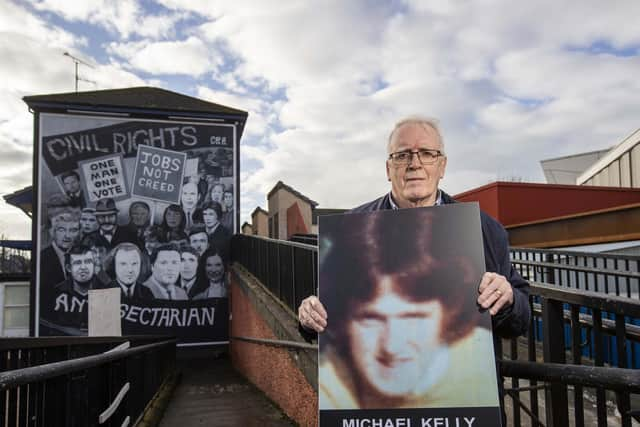Bloody Sunday families say battle for justice goes on after 50 years
However, relatives of several of those shot in Londonderry half a century ago this Sunday, have expressed doubts that they will ever be able to secure convictions over the deaths of their loved ones.
Thirteen civil rights protesters were shot dead by British soldiers and 15 injured in the Bogside area of the city on January 30 1972.
Advertisement
Hide AdAdvertisement
Hide AdAnother man shot by paratroopers that day died four months later. While many consider him the 14th victim of Bloody Sunday, his death was formally attributed to an inoperable brain tumour.


The bereaved families will gather on Sunday morning to recreate the route of the civil rights march which ended in tragedy 50 years ago.
A number of the families said the anniversary is a fresh opportunity to press for convictions, while also remembering the poignant events of 1972.
John Kelly, whose 17-year-old brother Michael was shot dead, said: "The 50th anniversary is important because of the injustice of it - the fact that innocent people were shot dead, and no-one was ever brought to justice for what they did.
"We have been campaigning for all of these years. It took us years through the Saville Inquiry, to show the world that our people were innocent, and we achieved that.
"We are now trying to see justice for our people.”
Tony Doherty's father Patrick, a civil rights activist, was shot dead on Bloody Sunday.
Mr Doherty said the Bloody Sunday families are angry at plans by the Conservative Government for what would effectively be an amnesty on Troubles-era prosecutions.
"It is never too late (for justice) but the signs aren't good at this present moment in time," he said.
Advertisement
Hide AdAdvertisement
Hide AdAbout 15,000 people gathered in the Creggan area of Derry on the morning of January 30 1972 to take part in a civil rights march, which was banned by the Stormont government of the time.
After Army barricades blocked the march, there was rioting before soldiers from the Parachute Regiment opened fire, leading to 13 deaths.
An immediate inquiry, led by then Lord Chief Justice Lord Widgery, was labelled a whitewash after it largely cleared the soldiers of blame.
After years of campaigning by victims' families, then-prime minister Tony Blair ordered a new inquiry in 1998.
The Saville Inquiry concluded in 2010 that none of the casualties were posing a threat or doing anything that would justify their shooting and then-prime minister David Cameron apologised in the House of Commons, saying that the killings were "unjustified and unjustifiable".
The Police Service of Northern Ireland subsequently began a criminal investigation, but last year it was announced that a prosecution against a veteran, Soldier F, for the murders of Jim Wray and William McKinney would not proceed amid concerns that the case could collapse in light of a separate court ruling on the admissibility of evidence which caused the collapse of another Troubles murder trial involving military veterans.
A number of families of Bloody Sunday victims are legally challenging decisions by the Public Prosecution Service not to prosecute veterans for murder over Bloody Sunday.
Judgments in the challenges have not yet been delivered.
Comments
Want to join the conversation? Please or to comment on this article.